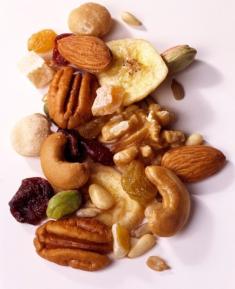Hazelnuts, also known as filberts, are delicious and versatile nuts that are popular in both sweet and savory dishes. Whether roasted to perfection or enjoyed in their raw form, hazelnuts offer a delightful crunch and a rich, buttery flavor. In this comprehensive guide, we will delve into the differences between roasted and raw hazelnuts, exploring their flavors, nutritional profiles, health benefits, and culinary uses. So, grab a handful of these nutrient-packed nuts and let’s discover the nutty world of hazelnuts! Roasted Hazelnuts: Unveiling the Flavorful Crunch Roasting hazelnuts is a popular way to enhance their flavor and texture. When hazelnuts are roasted, they undergo a transformation that brings out their natural oils and intensifies their nutty flavor. The roasting process also gives hazelnuts a satisfying crunch that adds an extra dimension to any dish.

.
 Roasted hazelnuts are commonly used in a variety of recipes, from baked goods like cakes, cookies, and granola to savory dishes like salads, roasted vegetables, and pesto. Their toasty aroma and rich taste make them a popular choice for adding depth and texture to both sweet and savory dishes. Nutritional Value of Roasted Hazelnuts: While roasting hazelnuts enhances their flavor profile, it does have an impact on their nutritional content. Roasted hazelnuts may lose some of their nutrient content compared to raw hazelnuts due to the exposure to heat during the roasting process. However, roasted hazelnuts still pack a nutritional punch and offer a variety of health benefits. Roasted hazelnuts are a good source of healthy fats, including monounsaturated and polyunsaturated fats, which are beneficial for heart health. They are also rich in vitamins and minerals such as vitamin E, copper, and manganese, which have antioxidant properties and support overall health and well-being. Health Benefits of Roasted Hazelnuts: Despite the slight reduction in nutrient levels during roasting, roasted hazelnuts still offer a range of health benefits.
Roasted hazelnuts are commonly used in a variety of recipes, from baked goods like cakes, cookies, and granola to savory dishes like salads, roasted vegetables, and pesto. Their toasty aroma and rich taste make them a popular choice for adding depth and texture to both sweet and savory dishes. Nutritional Value of Roasted Hazelnuts: While roasting hazelnuts enhances their flavor profile, it does have an impact on their nutritional content. Roasted hazelnuts may lose some of their nutrient content compared to raw hazelnuts due to the exposure to heat during the roasting process. However, roasted hazelnuts still pack a nutritional punch and offer a variety of health benefits. Roasted hazelnuts are a good source of healthy fats, including monounsaturated and polyunsaturated fats, which are beneficial for heart health. They are also rich in vitamins and minerals such as vitamin E, copper, and manganese, which have antioxidant properties and support overall health and well-being. Health Benefits of Roasted Hazelnuts: Despite the slight reduction in nutrient levels during roasting, roasted hazelnuts still offer a range of health benefits.
..
 The monounsaturated fats in hazelnuts can help lower LDL cholesterol levels and reduce the risk of heart disease. The vitamin E content in roasted hazelnuts acts as an antioxidant that protects cells from damage and helps boost the immune system. Roasted hazelnuts also contain phytochemicals like flavonoids and proanthocyanidins, which have anti-inflammatory and anti-cancer properties. These compounds contribute to the overall health benefits of hazelnuts and make them a valuable addition to a balanced diet. Culinary Uses of Roasted Hazelnuts: Roasted hazelnuts are a versatile ingredient that can be used in a wide range of culinary creations. From sprinkling chopped roasted hazelnuts over salads and yogurt parfaits to incorporating them into baked goods like brownies and muffins, the possibilities are endless. One popular way to enjoy roasted hazelnuts is by making homemade nut butter. Simply blend roasted hazelnuts in a food processor until smooth, adding a touch of honey or maple syrup for sweetness if desired. This delicious nut butter can be spread on toast, drizzled over pancakes, or used as a dip for fruits and vegetables. Raw Hazelnuts: Embracing the Natural Nutty Goodness Raw hazelnuts, on the other hand, offer a different experience than their roasted counterparts. Raw hazelnuts have a milder flavor and a softer texture compared to roasted hazelnuts. They retain their natural oils and nutrients, making them a wholesome and nutritious snack option.
The monounsaturated fats in hazelnuts can help lower LDL cholesterol levels and reduce the risk of heart disease. The vitamin E content in roasted hazelnuts acts as an antioxidant that protects cells from damage and helps boost the immune system. Roasted hazelnuts also contain phytochemicals like flavonoids and proanthocyanidins, which have anti-inflammatory and anti-cancer properties. These compounds contribute to the overall health benefits of hazelnuts and make them a valuable addition to a balanced diet. Culinary Uses of Roasted Hazelnuts: Roasted hazelnuts are a versatile ingredient that can be used in a wide range of culinary creations. From sprinkling chopped roasted hazelnuts over salads and yogurt parfaits to incorporating them into baked goods like brownies and muffins, the possibilities are endless. One popular way to enjoy roasted hazelnuts is by making homemade nut butter. Simply blend roasted hazelnuts in a food processor until smooth, adding a touch of honey or maple syrup for sweetness if desired. This delicious nut butter can be spread on toast, drizzled over pancakes, or used as a dip for fruits and vegetables. Raw Hazelnuts: Embracing the Natural Nutty Goodness Raw hazelnuts, on the other hand, offer a different experience than their roasted counterparts. Raw hazelnuts have a milder flavor and a softer texture compared to roasted hazelnuts. They retain their natural oils and nutrients, making them a wholesome and nutritious snack option.
…
Nutritional Value of Raw Hazelnuts: Raw hazelnuts are a powerhouse of nutrients, including healthy fats, protein, fiber, vitamins, and minerals. They are an excellent source of vitamin E, an antioxidant that plays a vital role in maintaining healthy skin, eyes, and immune function. Raw hazelnuts also provide a good dose of folate, a B vitamin essential for cell division and DNA synthesis. In addition, raw hazelnuts contain minerals like magnesium, phosphorus, and copper, which support bone health, energy production, and immune function. The fiber content in raw hazelnuts promotes digestive health and helps keep you feeling full and satisfied. Health Benefits of Raw Hazelnuts: Raw hazelnuts offer a plethora of health benefits, thanks to their nutrient-dense profile. The combination of healthy fats, protein, and fiber in raw hazelnuts makes them a satiating snack that can help curb cravings and promote weight management. The antioxidants in raw hazelnuts protect cells from free radical damage and reduce inflammation in the body. Raw hazelnuts are also beneficial for heart health due to their monounsaturated fat content, which can lower cholesterol levels and reduce the risk of cardiovascular disease. The magnesium in raw hazelnuts plays a role in regulating blood pressure and supporting muscle function, making them a heart-healthy snack choice. Culinary Uses of Raw Hazelnuts: Raw hazelnuts can be enjoyed in a variety of ways, whether eaten on their own as a snack or incorporated into recipes for added flavor and nutrition. One popular way to use raw hazelnuts is by making homemade hazelnut milk. Simply blend raw hazelnuts with water, a sweetener like dates or maple syrup, and a pinch of salt to create a creamy and delicious nut milk alternative.




Your comment submitted.